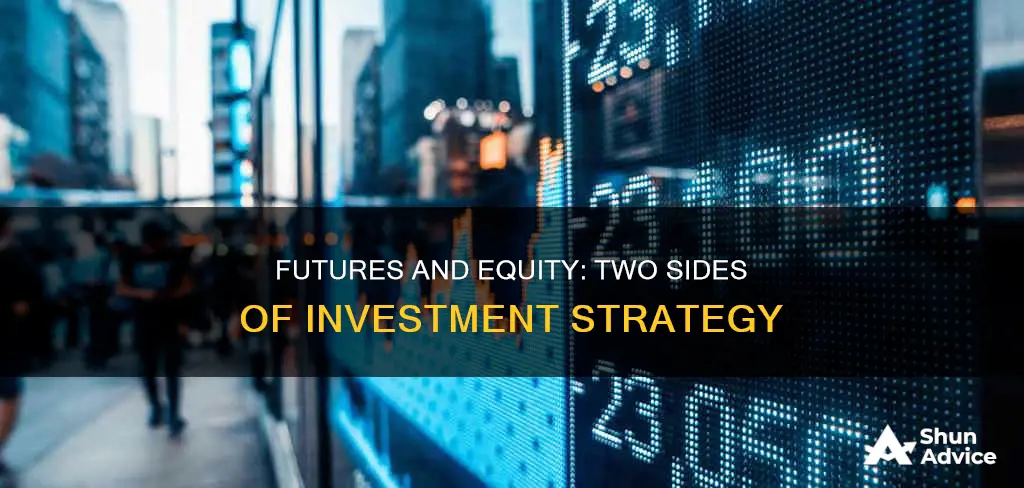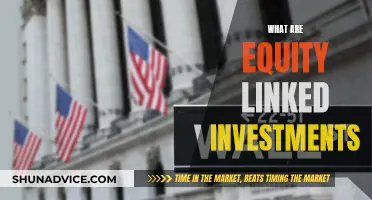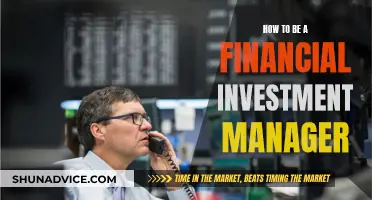
Futures are contracts to buy or sell a specific underlying asset at a set future date. The underlying asset can be a commodity, a security, or another financial instrument. Futures are derivatives, which means their value comes from the changes in the price of the underlying asset. They are a common vehicle for hedging and managing risk. They are also used for speculation, as they allow investors to speculate on the future price of a specific stock.
What You'll Learn

Futures are highly leveraged investments
Futures are financial contracts that commit buyers and sellers to transact an underlying asset at a preset price on a specified future date. They are highly leveraged investments, meaning that traders can enter into a position by putting up only a small percentage of the total contract value rather than its full cost. This provides greater capital efficiency and increased exposure.
For example, an E-mini S&P 500 future valued at $103,800 would require an initial margin of around $5,060, giving the trader exposure to the full value of the contract without having to pay the full amount upfront. This is a form of leverage, allowing traders to control a large contract value with a relatively small amount of capital.
Leverage is a double-edged sword, however. While it can amplify gains, it can also result in substantial losses if prices move against the leveraged position. In the case of the E-mini S&P 500 future, a 10% drop in the index would result in a total loss of the initial margin deposited.
Futures trading is often considered riskier than stock trading due to the high leverage and volatility involved. The high leverage in futures contracts means that traders risk losing more than their initial margin amount. It is possible to lose more money than initially invested in futures trading, and caution is advised for those without the proper skills and risk management strategies.
To manage the risks associated with leverage, traders can employ strategies such as diversification, education and research, hedging, options, position sizing, regular monitoring, and using risk-reward ratios and stop-loss orders.
Reliance India: A Comprehensive Guide to Investing
You may want to see also

Futures markets are very liquid
There are several reasons why futures markets are highly liquid. Firstly, futures contracts are standardised, meaning they are uniform in quantity, quality, and asset delivery. This standardisation makes it easier to trade these contracts on futures exchanges and enhances liquidity.
Secondly, futures markets are almost always open, allowing for trading outside traditional market hours. This flexibility means that traders can respond quickly to global events, increasing the liquidity of the market.
Thirdly, the futures markets attract a wide range of participants, including institutional investors, commodity producers, commodity consumers, and speculators. This diverse range of market participants contributes to the high liquidity of the futures markets.
Additionally, the Chicago Mercantile Exchange (CME), one of the top futures exchanges in the world, handles a significant volume of contracts daily, further contributing to the liquidity of the futures markets.
Finally, the most liquid futures contracts tend to be those with tight bid-ask spreads, where the difference between the bid price (what buyers are willing to pay) and the ask price (what sellers are offering) is minimal. These tight spreads indicate high liquidity and are often found in popular futures contracts such as the E-Mini S&P Futures (ES).
Overall, the combination of standardised contracts, flexible trading hours, diverse market participants, high-volume exchanges, and tight bid-ask spreads contributes to the high liquidity of the futures markets.
Debt Investment Portfolio: Understanding Your Debt Investments
You may want to see also

Commissions and execution costs are low
Commissions and execution costs are an important aspect to consider when trading futures contracts. While these costs can vary depending on the brokerage firm and the specific product being traded, there are ways to minimise their impact on your bottom line.
Firstly, let's understand what commissions and execution costs entail. Commissions are the fees paid to a futures commission merchant (FCM) or broker in return for facilitating trading operations and providing market access. Execution costs, on the other hand, refer to the total cost of executing a trade, including exchange fees, data fees, platform fees, and regulatory fees.
To achieve lower commissions, it's important to understand the commission structure offered by your brokerage firm. Commissions can be structured as flat fees or volume-based tiered structures, and negotiating with your broker can often lead to more favourable rates. Additionally, some brokers may offer discounted commission rates for high-volume traders or provide a free trading platform, reducing the overall execution costs.
Another way to minimise the impact of commissions and execution costs is to develop a trading strategy that limits their role in overall profitability. For example, keeping the all-in cost of executing a single trade below a certain percentage of the trade's aggregate return can help ensure that commissions don't eat into your profits. This can be achieved by extending profit targets, manipulating risk versus reward scenarios, or varying position size.
It's worth noting that the frequency of trading activities also plays a crucial role in determining the impact of commissions and execution costs. Intraday traders who execute a large number of trades daily will incur higher commission expenses compared to swing traders who place fewer trades. Therefore, for active traders, it is imperative to keep all-in costs, especially commissions, as low as possible to maintain profitability.
In summary, while commissions and execution costs are inherent in futures trading, there are strategies and approaches to mitigate their impact on your bottom line. Understanding the commission structures, negotiating rates, utilising volume discounts, and incorporating these costs into your trading strategy can help you keep these expenses manageable and ensure they don't outweigh the potential profits from your trades.
Investment Managers: New Products, Alpha Generation?
You may want to see also

Futures are great for diversification or hedging
Futures are a great way to diversify your portfolio and hedge against potential losses.
Diversification
Diversification is a common investing technique used to reduce the chances of experiencing large losses. By spreading your investments across different assets, you are less likely to have your portfolio wiped out due to a single negative event impacting that holding.
Futures offer access to a variety of assets that are hard to find elsewhere, such as commodities like soybeans, corn, wheat, oil, and natural gas. They also provide direct market exposure to underlying assets, rather than secondarily through stocks or funds.
For example, if you believe the price of oil will rise, you could buy oil futures, which may be one of the only ways to gain specific exposure to the price of oil.
Hedging
Hedging is a safeguard to reduce or offset the risk that prices will move against you. Futures contracts are often used for hedging purposes as they allow investors to lock in prices and take offsetting positions, effectively securing against the unpredictability of market movements.
For instance, a portfolio manager with a significant position in US Treasury bonds can hedge against interest rate increases by using US Treasury futures.
Hedging with futures can also be applied to long and short positions. A long hedge is used when you want to lock in the price now to protect against price increases in the future. Conversely, a short hedge is employed to protect against a decline in the price of your assets.
In summary, futures are a versatile tool that can be tailored to your specific needs. They allow you to lock in prices for the future, providing predictability and security in an uncertain market.
Understanding Investment Management vs Private Equity
You may want to see also

Futures markets are more efficient and fair
Secondly, the constant presence of buyers and sellers in futures markets ensures that market orders can be placed quickly, preventing drastic price fluctuations, especially for contracts nearing maturity. This liquidity also makes it easier to clear out large positions without significantly impacting the price. Additionally, many futures markets trade beyond traditional market hours, providing extended trading opportunities.
Furthermore, the structure and nature of futures contracts make them inherently fairer than other investment options. The actual stock or commodity being traded is rarely exchanged or delivered, except when a trader specifically hedges against a price rise and takes delivery upon expiration. For investors solely interested in speculative profits, futures are less cumbersome than holding individual stocks, as they eliminate the need for extensive record-keeping and shareholder management.
Lastly, the calculation of fair value in futures markets adds to their efficiency and fairness. Fair value, which considers the current index value, dividends, days to expiration, and interest rates, can highlight arbitrage opportunities. Traders can profit from these price imbalances by simultaneously purchasing and selling the asset in different markets or forms.
The Future of Investment: Side-by-Side Management
You may want to see also
Frequently asked questions
Futures are contracts to buy or sell a specific underlying asset at a set future date. The underlying asset can be a commodity, a security, or another financial instrument.
Equity futures are a type of derivative where parties involved must transact shares of a specific company at a predetermined future date and price. The price of the contract is determined by the spot price of the underlying stock.
Futures offer several benefits over trading straight stocks, including greater leverage, lower trading costs, and longer trading hours. Futures are also highly liquid and provide opportunities for diversification and hedging.
Investing in futures can be risky due to the high leverage involved. It is possible to lose more than the amount initially invested, especially if the market moves against your position. Additionally, futures contracts require a significant capital commitment and obligate both the buyer and the seller.
Before investing in futures, it is important to understand how they work and carefully consider the risks involved. Ensure you have sufficient financial experience, knowledge, and resources. You will need to open an account with a brokerage firm that offers futures trading and meet any margin requirements.







